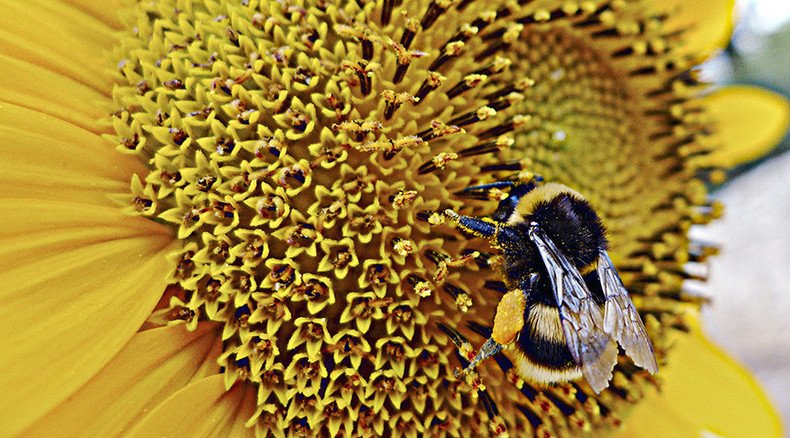Common pesticide could hinder bumblebees’ ability to pollinate plants – study

A new study has found that after exposure to pesticides, bumblebees faced hindered pollination abilities – they visited fewer flowers and returned with less pollen, leading to less apple seeds.
The paper, published on Wednesday in the journal Nature, tested the effects of the pesticide thiamethoxam, which belongs to a class of pesticides known as neonicotinoids. It also looked at the ability of the bumblebee to pollinate apple trees. Previous studies had only testing the effects of pesticides on honey bees, and not bumblebees.
In the experiment, researchers used three groups of bees, comprised of 24 colonies with a queen bee and 99 workers. They exposed the first two groups to two different “field-realistic” levels of the pesticide, or amounts that are actually used by farmers to protect their crops — 2.4 parts per billion and 10 parts per billion. The third group wasn’t exposed to any pesticides at all. Colonies exposed to the 10 parts per billion level experienced the strongest effects.
Revealed - Pesticides hurt bees' ability to pollinate, implications for food crops https://t.co/V8Uxx12hxp
#Neonicspic.twitter.com/WEcpysAqKM
— Damian Carrington (@dpcarrington) November 18, 2015Researchers found that bumblebees exposed to the pesticide made fewer visits to apple trees and collected less pollen, which in turn led to apples containing fewer seeds, “demonstrating a reduced delivery of pollination services,” according to the study’s findings.
“Our results also indicate that reduced pollination service delivery is not due to pesticide-induced changes in individual bee behavior, but most likely due to effects at the colony level,” according to the study’s lead author, Dara Stanley, formerly a researcher at Royal Holloway University of London, where the study was conducted.
“These findings show that pesticide exposure can impair the ability of bees to provide pollination services, with important implications for both the sustained delivery of stable crop yields and the functioning of natural ecosystems.”
#Neonics pesticide 'affects ability of #bees to pollinate fruit trees' https://t.co/NHLKRSp7Jp
— Marco (@vBelz) November 19, 2015The study is likely to add fuel to the ongoing debate over how certain pesticides affect the environment, and whether their continued use should be permitted in the US.
The European Union has restricted the use of a handful of neonicotinoid pesticides in recent years, including thiamethoxam, which is manufactured by Syngenta – a company that agrichemical giant Monsanto is considering taking over, according to Reuters.
Syngenta has several insecticide brands which contain thiamethoxam. The chemical company says that the insecticide has gone through safety tests and “scientific evidence clearly shows that bees and other pollinators can coexist safely with neonicotinoids.”
Coffee buzz: Honey bees are caffeine fiends http://t.co/Cp0sibLUbupic.twitter.com/7p38xfGQSv
— RT America (@RT_America) October 17, 2015The study was criticized by a senior environmental risk assessor at Syngenta, Peter Campbell, who said in a statement to the Washington Post that “the conclusion reached in this study…is not conclusive, it is premature, and only representative of a single experiment conducted under artificial conditions for the apple trees being pollinated and using unrealistic exposed bumble bees.”
Campbell added that other aspects of the bees’ pollination services were not affected. While the treated colonies were less active pollinators and were associated with fruits that contained fewer seeds, it did not seem to make a significant difference in whether the trees produced fruit or how much fruit they produced.
The study’s authors did say it’s unclear whether the altered behavior of pesticide-exposed colonies may affect other plants differently, but they stressed that the reduced seed production observed in the study could be a serious problem for agricultural production in the future, possibly lowering the quality of fruit crops.
US govt’s wanton approval of harmful pesticides fueling ‘bee holocaust’ - lawsuit http://t.co/o8gzaIGeHp
— RT America (@RT_America) December 27, 2013The study did show one anomaly. When bumblebees were released alone in the field, they were actually more active, visiting more flowers, spending longer times foraging, and switching between apple trees.
“When we opened up the colonies, less bees were actually coming out of the colony.” Stanley said. “The colony overall was less active in sending out foragers.”
Stanley said this raises questions about the effects of pesticides on a single bee and on colony behavior – a question that would need further study.












